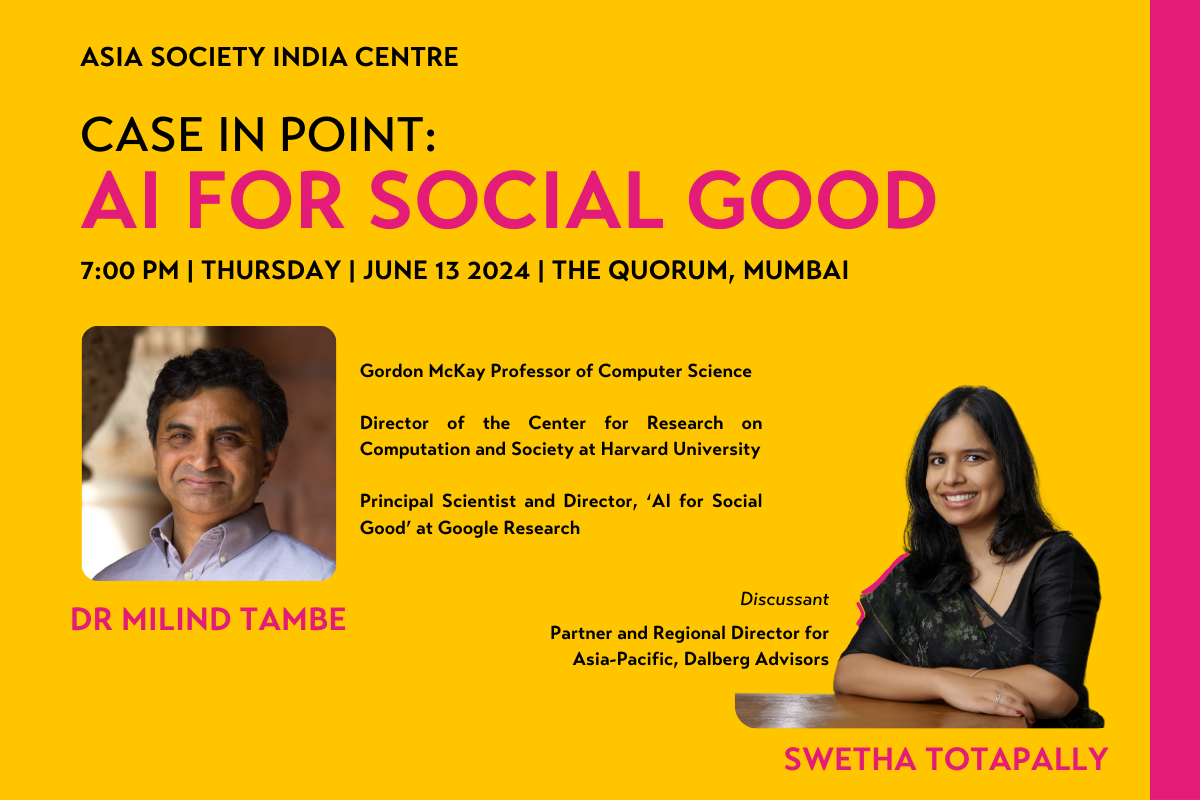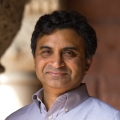Case in Point: AI for Social Good
VIEW EVENT DETAILSThursday, June 13, 2024, 7:00 pm

Since the dot com boom of the early 2000s, humanity has seen more advancement in tech and artificial intelligence than in the previous 100 years combined. From CRISPR gene editing technology and mRNA vaccines to the birth of smartphones and ‘smart homes,’ progress in technology, particularly artificial intelligence, has been rapid. This has led to a new onslaught of issues previously impossible to conceive of: from ethical and moral challenges like bias and privacy, to issues of accountability, transparency, and lack of regulatory frameworks.
In 2016, Facebook and a political consulting firm collected the data of 87 million Facebook users without consent, which they then used to build voter profiles ahead of the U.S. general elections. A few years later, an AI model used in healthcare risk prediction showed racial bias because it used a faulty metric to assess need, incorrectly classifying black patients as low-risk due to their lower medical expenditure. These are just a few examples; in recent times, the risks associated with AI have led to broad public skepticism and business concerns, due to which 36 countries, and governing bodies, particularly the European Union, have recently instated AI regulatory laws. The Harvard Business Review identifies AI’s “Trust Problem” as one of the key issues in today’s world.
Given these concerns, can AI be harnessed in ways that are beneficial, moving beyond the narrow concerns of profit and ownership? Imagine if we could foresee natural disasters before they occur; or monitor the spread of diseases and eradicate them faster? Or what if we could significantly enhance the quality of life for individuals with disabilities? A 2024 Mckinsey Digital report highlighted over 600 cases of AI being used for social causes, which have helped all 17 of the UN Sustainable Development Goals.
In the first programme of Case in Point, Dr. Milind Tambe, Professor of Computer Science, and Director of the Center for Research on Computation and Society, Harvard University and Director of 'AI for Social Good' at Google Research, will present his work on AI for social good, detailing the ways in which AI can be used to model healthcare initiatives, and to better the health infrastructure of South Asia. He will discuss the potential replicability in other sectors and other geographies, and the future of AI for social good in a broader sense. The programme will provide context and some answers to the burning questions about artificial intelligence today: can AI help humanity? What policies and changes must be enacted to ensure society as a whole benefits from AI, and in what capacity? Do we have the knowledge currently to ensure AI assists in all social enterprises, and what steps must be taken to ensure AI usage is transformed to help humanity?
The presentation will be followed by a moderated discussion and interaction with the audience.
This event has limited seating. Members will be given priority.
Asia Society India Centre’s Case in Point series features practitioners across business and culture as they go in-depth on one project or initiative in their work, opening up discussion for how replicable, relevant and effective the case is for the field at large.
SPEAKERS

Milind Tambe is Gordon McKay Professor of Computer Science and Director of Center for Research on Computation and Society at Harvard University; concurrently, he is also Principal Scientist and Director for 'AI for Social Good' at Google Deepmind. He is recipient of the AAAI Award for Artificial Intelligence for the Benefit of Humanity, AAAI Feigenbaum Prize, IJCAI John McCarthy Award, AAAI Robert S. Engelmore Memorial Lecture Award, AAMAS ACM Autonomous Agents Research Award, INFORMS Wagner prize for excellence in Operations Research practice, Military Operations Research Society Rist Prize, Columbus Fellowship Foundation Homeland security award and commendations and certificates of appreciation from the US Coast Guard, the Federal Air Marshals Service and airport police at the city of Los Angeles. He is a fellow of AAAI and ACM. Prof. Tambe and his team have developed pioneering AI systems that deliver real-world impact in public health (e.g., maternal and child health), public safety, and wildlife conservation.

Swetha Totapally is the Regional Director for Dalberg Asia Pacific. Over her 13-year career at Dalberg, Swetha has led the firm’s global gender practice and developed a portfolio focused on addressing issues such as violence against women and girls, sexual exploitation, and unpaid care work. Her work illuminates the social, economic, and political dimensions of these issues, driving decision-makers to recognize the need for transformative change within institutions and systems.
Swetha has led multiple large-scale research-to-action efforts which are designed to bring the experiences and perspectives of people to decision-makers. This includes the world’s largest and most comprehensive effort to understand users’ experience with Aadhaar—India’s national ID system; a series of studies during the Covid pandemic that captured how women were impacted, how well government entitlements were reaching people, and the effects of the pandemic on early childhood development. Her work on The State of Digitization in Kenya, and the Next Half Billion in India, explore how people are engaging digitally today with an eye to how they can better participate in digital economies. Clients include the United Nations, Omidyar Network, the Freedom Fund, and the Global Fund to End Modern Slavery.
An advocate for building professional diversity within consulting, Swetha has shaped initiatives like the Dalberg Asia-Pacific Residency Program. She has helmed the region’s recruitment efforts and upheld Dalberg’s commitment to gender diversity within teams including senior management.
Prior to Dalberg, Swetha worked at JP Morgan Chase, where she served as an advisor to financial institutions. She graduated from Yale University with a degree in Economics and Mathematics. She speaks English, Hindi, and Telugu. Swetha lives in Mumbai with her husband and three young children.
VENUE PARTNER

Event Details
The Quorum, 8th Floor, Tower 2A, North Annex, One World Center, Senapati Bapat Marg, Saidham Nagar, Lower Parel, Mumbai, Maharashtra 400013.